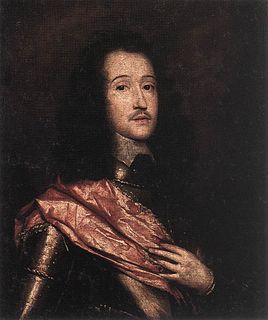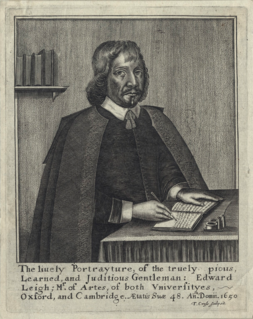Related Research Articles

Richard Lovelace was an English poet in the seventeenth century. He was a cavalier poet who fought on behalf of the king during the Civil War. His best known works are "To Althea, from Prison", and "To Lucasta, Going to the Warres".
Unitarianism is a Christian theological movement named for its belief that the God in Christianity is one entity, as opposed to the Trinity which in most other branches of Christianity defines God as one being in three persons: the Father, Son, and Holy Spirit. Unitarian Christians, therefore, believe that Jesus was inspired by God in his moral teachings, and he is a savior, but he was not a deity or God incarnate. As is typical of dissenters, Unitarianism does not constitute one single Christian denomination, but rather refers to a collection of both existing and extinct Christian groups, whether historically related to each other or not, which share a common theological concept of the oneness nature of God. Unitarian communities have developed in Britain, South Africa, India, Canada, the United States, Jamaica, Nigeria, and Japan.

Socinianism is a system of Christian doctrine named for Italians Lelio Sozzini and Fausto Sozzini, uncle and nephew, respectively, which was developed among the Polish Brethren in the Minor Reformed Church of Poland during the 16th and 17th centuries and embraced by the Unitarian Church of Transylvania during the same period. It is most famous for its Nontrinitarian Christology but contains a number of other unorthodox beliefs as well.
The Polish Brethren were members of the Minor Reformed Church of Poland, a Nontrinitarian Protestant church that existed in Poland from 1565 to 1658. By those on the outside, they were called "Arians" or "Socinians", but themselves preferred simply to be called "Brethren" or "Christians," and, after their expulsion from Poland, "Unitarians".

John Moore (1646–1714) was Bishop of Norwich (1691–1707) and Bishop of Ely (1707–1714) and was a famous bibliophile whose vast collection of books forms the surviving "Royal Library" within Cambridge University Library.

John Goodwin (1594–1665) was an English preacher, theologian and prolific author of significant books.
John Biddle or Bidle was an influential English nontrinitarian, and Unitarian. He is often called "the Father of English Unitarianism".
Thomas Aikenhead was a Scottish student from Edinburgh, who was prosecuted and executed at the age of 20 on a charge of blasphemy under the Act against Blasphemy 1661 and Act against Blasphemy 1695. He was the last person in Great Britain to be executed for blasphemy. His execution occurred 85 years after the death of Edward Wightman (1612), the last person to be burned at the stake for heresy in England.
John Arrowsmith was an English theologian and academic.
Thomas Hill was an English Puritan divine. Born at Kington, Herefordshire, he took a B.A. in 1622 at Emmanuel College, Cambridge, an M.A. in 1626, a B.D. in 1633 and a D.D. in 1646.
Biblical Unitarianism encompasses the key doctrines of Nontrinitarian Christians who affirm the Bible as their sole authority, and from it base their beliefs that God the Father is a singular being, the only one God, and that Jesus Christ is God’s son, but not divine. The term "biblical Unitarianism" is connected first with Robert Spears and Samuel Sharpe of the Christian Life magazine in the 1880s. It is a neologism that gained increasing currency in nontrinitarian literature during the 20th century as the mainstream Unitarian churches moved away from belief in the Bible and, in the United States, towards merger with Universalism. It has been used since the late 19th century by conservative Christian Unitarians, and sometimes by historians, to refer to Scripture-fundamentalist Unitarians of the 16th–18th centuries. Its use is problematic in that Unitarians from the 17th to the 20th centuries all had attachment to the Bible, but in differing ways.
Francis Cheynell (1608–1665) was a prominent English religious controversialist, of Presbyterian views, and President of St John's College, Oxford 1648 to 1650, imposed by the Parliamentary regime.
Unitarianism, as a Christian denominational family of churches, was first defined in Poland-Lithuania and Transylvania in the late 16th century. It was then further developed in England and America until the early 19th century, although theological ancestors are to be found as far back as the early days of Christianity. It matured and reached its classical form in the middle 19th century. Later historical development has been diverse in different countries.
Richard Vines was an English clergyman, one of the Presbyterian leaders of the Westminster Assembly. He became Master of Pembroke Hall, Cambridge, from 1644 to 1650.

Sir Edward Leigh was an English lay writer, known particularly for his works on religious topics, and a politician who sat in the House of Commons from 1645 to 1648.
John Knowles was an English antitrinitarian preacher, imprisoned in 1665.
Iwan Tyszkiewicz or Iwan (Jan) Tyszkowic was a Socinian Unitarian executed for blasphemy and heresy by the Polish–Lithuanian Commonwealth at the great marketplace of Warsaw.
Charles Fairfax (1597–1673) was an English antiquary and genealogist.

James Nalton (1600?–1662) was an English Presbyterian minister, known as "the weeping prophet".
References
- ↑ The Cambridge History of English and American Literature in 18 Volumes (1907–21). Volume X. The Age of Johnson. XVI. The Literature of Dissent. § 7. The spread of Arianism and the First Socinian Controversy.
- ↑ DNB entry citing sources as : "(i) Ley's MS., formerly in possession of H. B. Bright, and latterly of Joseph Hunter (antiquarian), from his Chorus Vatum ; (ii) letters from Rev. Horace Newton, Driffield; (iii) Robert Wallace (Unitarian) Anti-Trinitarian Biography, i. 87, iii. 161; (iv) Bulstrode Whitelocke (1605-1675) Memorials; (v) Daniel Neal History of the Puritans, iii. 292 ; (vi) Best's Works."
- ↑ "Best, Paul (BST606P)". A Cambridge Alumni Database. University of Cambridge.
- ↑ Theodore Albert Schroeder Constitutional Free Speech Defined and Defended: In an Unfinished Argument in a case of Blasphemy 1919 p257
- ↑ Peter G. Bietenholz Encounters with a radical Erasmus: Erasmus' work as a source of radical thought in Early Modern Europe (Erasmus Studies) (9780802099051) 2008 p175
- ↑ "A Letter of Advice unto the Ministers Assembled at Westminster" April 1646
- ↑ To Certaine Honourable Persons of the House of Commons